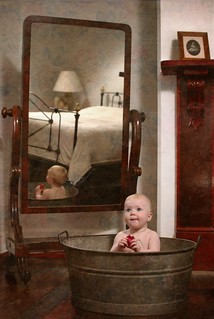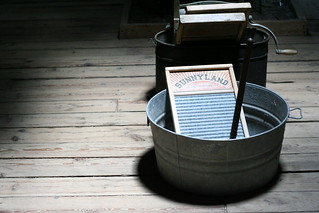By Kerry Knight
 |
| Emma & the Washtub textured (Photo credit: Barney Wrightson) |
How have the demographics of the common American family
changed the size and functionality of our homes over the past century?
A hundred years ago, home designs in the U.S. were much
different than they are today. For
middle class America, they were more functional than elegant. Kitchens were normally larger, especially in
rural areas, because families were bigger.
There were many farm homes, where a couple might raise ten or twelve
kids. Having a larger family virtually guaranteed
help in farming the fields, which, before the invention and proliferation of
automated machinery, was physically labor intensive. But feeding more people meant needing a
larger kitchen. Conversely, bedrooms and
bathrooms were small because no one spent much time there … folks were just too
busy. In some homes, the bath tub was
simply a large, metallic tub, in which families would also later do their
laundry. (You’ve perhaps seen photos of those old, metallic washboards, where
clothes were washed clean using manual friction?) So aside for a small area
this tub and perhaps standalone washing basin, there wasn’t much else in ― or
room for ― a full-functioning bathroom.
 |
| Sunnyland Washer (Photo credit: lars hammar) |
Likewise, in textile towns, houses were designed
primarily for utility. Companies would
move in and build entire developments for their workers. Some of these were called mill villages. All the houses basically looked the same, again
with small bathrooms and bedrooms being the norm.
Apartments in urban centers were also fairly small, and
consequently had limited sized bathrooms and kitchens. One of the advantages of
the then newly invented vertical, one-person shower was that it didn’t require
as much floor space as a bathroom with a horizontal bathtub that could fit two
adults or three or four kids.
Times have changed.
Today, bedrooms and especially bathrooms are two to three times larger
than yesterday’s. There’s far more
emphasis on comfort, leisure, design and elegance. Even in modest homes, modern design calls for
a garden tub, double vanities and extended countertops. Separate showers, a small room for the toilet
(often times with its own door), and linen closets are common.
Customer testimonial on Her Claw Foot Tub
With this new look, many bathrooms are sporting new bath
tub designs. Instead of the old, common
drop-in tubs, space is available for free-standing, claw foot and slipper tubs,
so-called because they resemble a women’s slipper supported by four feet.
Pedestal tubs are similar, but instead of being supported by feet, these
include a pedestal underneath, hence their name. These modern tubs still manage
to reflect a degree of “old world” elegance as they’d become very popular among the aristocracy in
late 19th century Europe.
 Today’s common design choices for cast-iron, porcelain tubs are Single Slippers,
with a dramatic slope on one end; Double Slippers, with slopes on each end; Double
Ended, offering a symmetrical dual slope with a center drain; and of course,
the traditional Roll Rim tubs. The most
elegant of these are sturdily constructed of cast-iron and porcelain, and are capable
of lasting several lifetimes. While heavier
than traditional drop-in tubs, they’re extremely durable, unlike today’s more
common acrylic tubs that fade and show wear and tear rather quickly.
Today’s common design choices for cast-iron, porcelain tubs are Single Slippers,
with a dramatic slope on one end; Double Slippers, with slopes on each end; Double
Ended, offering a symmetrical dual slope with a center drain; and of course,
the traditional Roll Rim tubs. The most
elegant of these are sturdily constructed of cast-iron and porcelain, and are capable
of lasting several lifetimes. While heavier
than traditional drop-in tubs, they’re extremely durable, unlike today’s more
common acrylic tubs that fade and show wear and tear rather quickly.
These stand-alone unique tubs can become the centerpiece
of the larger bathrooms that are being built today. Mounted on exotic legs in metallic finishes including
chrome, brushed nickel and oil-rubbed bronze, they create a whole new look in
the bathroom. They offer a very relaxing
bathing experience, but equally as important, they suggest a more treasured
appreciation for the home itself.
If your aim is to express your keen decorating skills,
one way to do so is by installing an attractive, new claw foot tub in your
garden bath. The exterior (and even
interior) of the tub can be painted in a wide variety of colors, if you really
want to make a “fashion statement.” (More traditionalists usually opt for neutral)
white. Likewise, there’s a wide range of
fashionable yet functional accessories you can buy to make your bathing experience
even more enjoyable.
If you have a smaller home, or smaller bath, consider
expanding it. With remodeling, you can
add a lot more value to your home.
Simple projects such as adding a longer countertop in a stone finish; or
perhaps porcelain, pedestal sink with antique mirror; and, of course installing
and a handsome, new claw foot tub, can add tremendous value without breaking
the bank.
Get rid of that old, out-of-date drop-in tub and replace
it with a new cast-iron, porcelain claw foot design. Its elegance and
durability will enhance your bathroom and bathing experience for years.
Short Video about Claw foot tubs
In this article, I talked about the difference between
the bathroom sizes and designs of yesteryear in comparison to today. I
discussed the various types of cast-iron, porcelain claw foot tubs that are
available which can enhance any bathroom’s décor. I also mentioned a few
suggestions on popular bathroom upgrades that are available today.
Short Video about Walk In Tubs
If you found this article useful, please share it with
your friends and co-workers. If you have a comment related to this article,
leave it in the comment section of this blog. If you’d like to
receive a FREE Walk-In Tub Buyers’ Guide, click here. Have
a question? Feel free to contact me at the number or email listed at the end of
this article and I’ll personally get back to you. It’s been my pleasure sharing
this information with you. We hope to be helping you in the near
future.
Until next time.
Alan and Kerry Knight are the
owners of Tub King, Inc., and SeniorBathtub.com in Jacksonville, Florida. Together
they have many years of experience in the antique and senior bathtub
industries. Their companies not only provide superior products, they are also
award winners, receiving the “Best of Jacksonville Chamber Award” three years
running. If you’d like to contact them, call (800) 409-3375 or (800) 843-4231;
or send an email alan@tubking.com.
Related articles












No comments:
Post a Comment